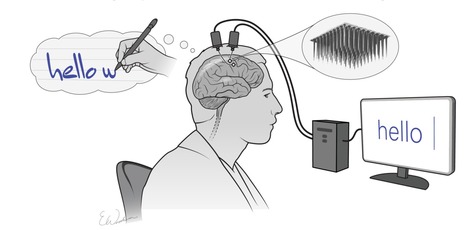The combination of mental effort and state-of-the-art technology have allowed a man with spinal injury and immobilized limbs, to communicate by text at speeds rivaling those achieved by his able-bodied peers texting on a smartphone.
Call it mindwriting.
Scientists at Stanford University, Howard Hughes Medical Institute, and Brown University, developed an implanted brain-computer interface (BCI) technology that uses artificial intelligence to convert brain signals generated when someone visualizes the process of handwriting, into text on a computer, in real time.
The team now reports on a trial in which a paralyzed clinical trial participant with a BCI implant was able to “type” words on a computer by merely thinking about the hand motions involved in creating written letters. The software effectively decoded the information from the BCI to quickly convert the man’s thoughts about handwriting into text on a computer screen. In the reported study, the 65-year-old male participant achieved a typing rate of 90 characters per minute, more than double the previous record for typing with a brain-computer interface.
The goal is to restore the ability to communicate by text.
As per Frank Willett, PhD, the first author of the paper, The system is so fast because each letter elicits a highly distinctive activity pattern, making it relatively easy for the algorithm to distinguish one from another,
The new study is part of the BrainGate clinical trial, directed by Leigh Hochberg, MD, a neurologist and neuroscientist at Massachusetts General Hospital, Brown University, and the Providence VA Medical Center. The BrainGate collaboration has been working for several years on systems that enable people to generate text through direct brain control.
While a major focus of BCI research has been on restoring gross motor skills, as the team further noted, “rapid sequences of highly dexterous behaviors, such as handwriting or touch typing, might enable faster rates of communication.” What wasn’t known, they pointed out, was whether “… the neural representation for a rapid and highly dexterous motor skill, such as handwriting, also remains intact.”
Next, the team intends to work with a participant who cannot speak, such as someone with amyotrophic lateral sclerosis, a degenerative neurological disorder that results in the loss of movement and speech. In addition, they are looking to increase the number of characters available to the participants, such as capital letters and numbers.
read the paper "High performance Brain-to-Text communication via handwriting"
read the article in its entirety at https://www.genengnews.com/news/brain-computer-interface-converts-mental-handwriting-into-written-text/



 Your new post is loading...
Your new post is loading...









Its a new form of communication, called mindwritting, that helps many paralyzed patients to express themselves, almost instantly. The communication barrier is broken and better care is possible.